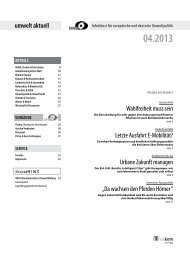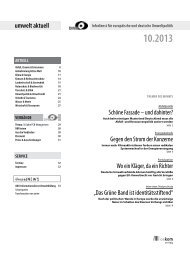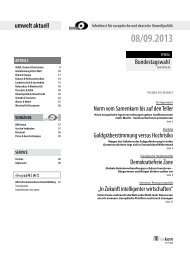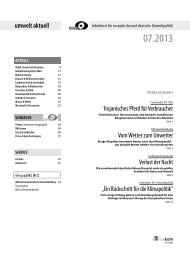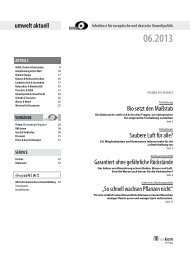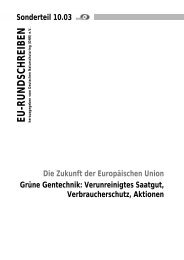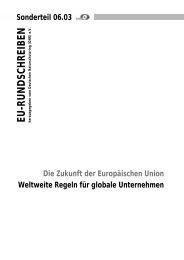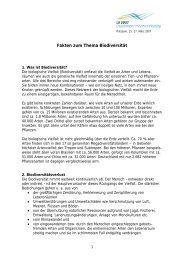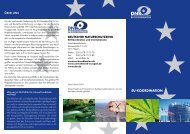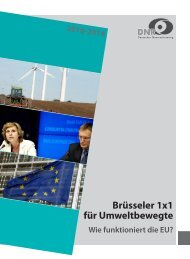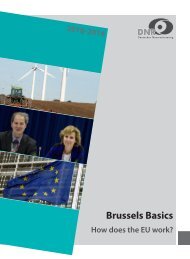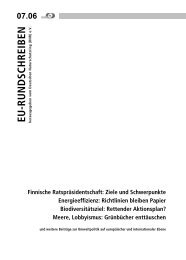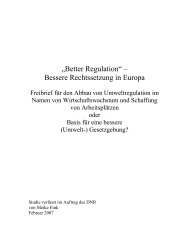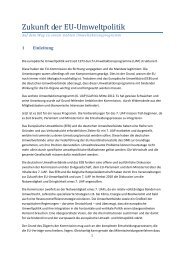Nachhaltiges Europa Abschlusspublikation - Global Marshall Plan
Nachhaltiges Europa Abschlusspublikation - Global Marshall Plan
Nachhaltiges Europa Abschlusspublikation - Global Marshall Plan
Sie wollen auch ein ePaper? Erhöhen Sie die Reichweite Ihrer Titel.
YUMPU macht aus Druck-PDFs automatisch weboptimierte ePaper, die Google liebt.
Rules<br />
enhancing available global instruments that could<br />
go in the right direction, such as the OECD Guidelines<br />
for Multinational Enterprises.<br />
– The European Parliament originally wanted a<br />
“European Code of Conduct” for EU-based Multinational<br />
Enterprises. The Commission suggested that<br />
improved OECD Guidelines could usefully play that<br />
role while levelling the playing field.<br />
– Civil society has been asking since the end of<br />
the negotiation of the draft Multilateral Agreement<br />
on Investment in the OECD, and in the WTO con-<br />
text as well, that Multinational Enterprises should<br />
contribute to Sustainable Development.<br />
The OECD review of the Guidelines for Multina-<br />
tional Enterprises led to a new instrument that<br />
was successfully agreed upon in June 2000. The<br />
guidelines contain best practices for companies<br />
notably in the field of social relations and the environment.<br />
In terms of process, the OECD Committee on Investment<br />
and Multinational Enterprises (CIME)<br />
consulted civil society through representatives to<br />
the OECD of business (BIAC, Business and Industry<br />
Advisory Committee to the OECD), trade un-<br />
ions (TUAC, Trade Union Advisory Committee to<br />
the OECD) and non-governmental organisations.<br />
The draft text was also posted on the internet for<br />
comments. This process helped in empowering all<br />
stakeholders in the CSR cooperative working habit,<br />
and gave a stronger support for the compromise<br />
from civil society. The Guidelines now represent an<br />
important instrument of the global architecture of<br />
CSR that is widely recognised.<br />
One of the questions that is preoccupying us today<br />
is what to do to combat the short-termism which<br />
might make a company, or a sector, lay so much<br />
stress on maximising shareholder value or this<br />
year’s profits, that keeping a responsible contract<br />
with its employees takes second place. CSR, and<br />
the civil pressure that it channels, have important<br />
roles to play in increasing the number of companies<br />
who see their own interest in taking the<br />
longer view.<br />
But CSR is a complement to improving the international<br />
framework of rules, such as Multilateral<br />
Environmental Agreements (MEAs), and core<br />
labour standards, which can be agreed upon at international<br />
level and whose implementation falls to<br />
nation states. Where that implementation is unsat-<br />
isfactory there are also state-driven and rulesdriven<br />
ways of bringing pressure to bear. See the<br />
revision of the EU’s General System of Preferences<br />
<strong>Nachhaltiges</strong> <strong>Europa</strong><br />
(GSP) which reserves certain tariff preferences to<br />
countries who ratify and implement MEAs.<br />
This is very much part of the European Union’s<br />
successive positions and Council Conclusions on<br />
sustainable development, we need to promote<br />
sustainable development externally by means<br />
which draw on the experience we have gained in-<br />
ternally of building institutions and basing behaviour<br />
on a clearly understood framework of rules.<br />
The role of EU values and practice<br />
The EU is, of course, a very particular model of po-<br />
litical, economic and social integration. While preserving<br />
distinct national identities for its Member<br />
States, the EU has created a single market with<br />
free movement of goods, services, capital and<br />
people. Economic and monetary union has pushed<br />
the process further still, opening up new opportu-<br />
nities for producers of goods, providers of services<br />
and for consumers. In doing so, it has contributed<br />
to improving living conditions of its citizens and in<br />
particular for those in the least developed Member<br />
States. The GDP per capita of Spain and Portugal<br />
has increased from respectively 71% and 54% of<br />
the EU average in 1985, when they joined the EU,<br />
to 86% and 71% in 2002, while that of Ireland has<br />
jumped from 60% in 1973 to over 125% in 2002.<br />
There has long been a strong social dimension to<br />
the economic integration of Europe. At the time of<br />
the common market, the social dimension focused<br />
principally on workers' rights, gender equality and<br />
social and economic cohesion through Structural<br />
Funds. But, with increasing integration, it has expanded<br />
to encompass a broader range of objectives,<br />
including full employment and higher quality<br />
jobs, the quality of education and training systems,<br />
adequate and sustainable social protection,<br />
the promotion of social dialogue and the fight<br />
against discrimination and social exclusion. These<br />
objectives are reflected in the European treaties<br />
and the conclusions of Heads of State and<br />
Government of EU Member States at various<br />
meetings of the European Council.<br />
The report of the World Commission on the Social<br />
Dimension of <strong>Global</strong>isation (WCSDG) identifies a<br />
number of elements of the EU model as having<br />
contributed particularly to its success in improving<br />
living and working conditions: a strong legal<br />
framework; openness to the world economy and<br />
an effective market economy; supportive national<br />
social protection systems and common minimum<br />
standards for employment; involvement of the<br />
stakeholders through the European social dialogue;<br />
gender equality; and, more widely, respect<br />
for human rights and the rule of law, democracy<br />
and the strengthening of democratic supervision<br />
49



